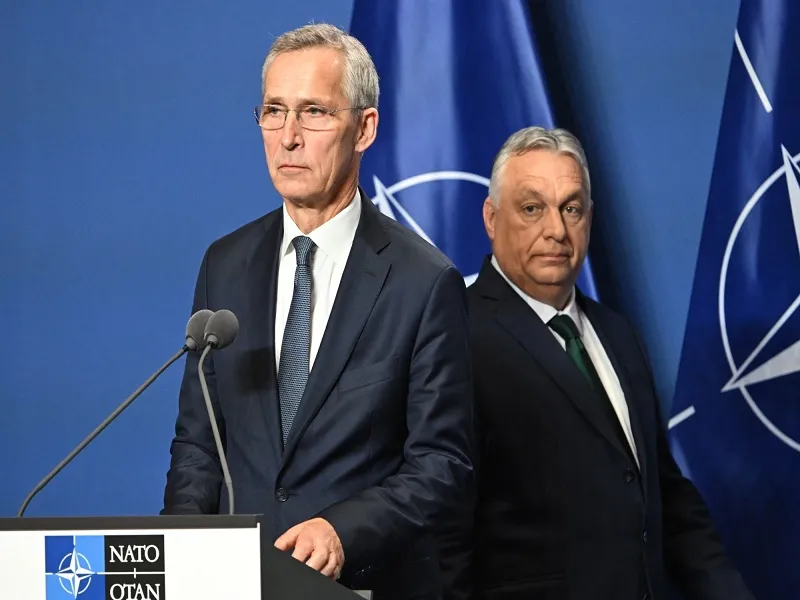
Orban Got What He Wanted From NATO & Ensured Hungary’s Objective National Interests
Keep up to Date & Bypass the Big Tech Censorship
Get uncensored news and updates, subscribe to our daily FREE newsletter!
It was always unrealistic to imagine that Orban could stop NATO’s plans in Ukraine.
Wednesday’s meeting between Hungarian Prime Minister Viktor Orban and NATO chief Jens Stoltenberg saw the two leaders reach an agreement on the bloc’s military aid to Ukraine. Hungary won’t oppose NATO’s decisions in this regard like it briefly did the EU’s in exchange for NATO not forcing Hungary to participate in a conventional intervention there, allow its territory to be used to facilitate that, and fund the Ukrainian Armed Forces. Simply put, they agreed to disagree and not interfere in the other’s affairs.
While some observers abroad who are favorable towards Orban might be disappointed by this, they’d do well to reflect on how unrealistic it was for them to imagine that he alone could stop NATO’s plans. The Hungarian leader has become a cult hero among Western dissidents who oppose the bloc’s proxy war on Russia through Ukraine after bravely warning over the past two years about how irresponsible and dangerous this policy is. His strongly worded statements perfectly channeled their views on this issue.
| Recommended Books [ see all ] | ||||
|---|---|---|---|---|
 |  |  |  |
 |
Nevertheless, he’s ultimately just one man in charge of a comparatively small country whose role in this proxy war is overshadowed by nearby Poland’s and neighboring Romania’s. It was therefore impossible for him to throw a wrench in NATO’s plans and all that he could ever hope for at best was to get public guarantees that Hungary wouldn’t be drawn into this imbroglio. That’s precisely what he received on Wednesday, which Stoltenberg gave him in an attempt to improve the bloc’s reputation.
From NATO’s perspective and keeping in mind Hungary’s inability to stop a conventional intervention in Ukraine as well as prevent others from funding the Ukrainian Armed Forces, it made the most sense to leave that wayward member alone in order to deflect from allegations of bullying. Publicly pressuring Hungary to send its troops to Ukraine and let others transit across its territory despite how unpopular these policies are at home could draw negative comparisons between NATO and the Warsaw Pact.
Accordingly, Hungarians might violently rebel against their literal NATO occupiers in that case and could also obstruct the logistical routes upon which this conventional intervention would depend, thus creating many more security, logistical, and image problems than it’s worth. That’s why the choice was made to respect Hungary’s decision to remain outside the ambit of these activities, which is pragmatic and also lends false credence to claims that NATO is a collection of democracies, not liberal dictatorships.
Orban knew that he’d never able to stop what might be coming, which is why he only wanted to get public guarantees that his country’s objective national interests would be ensured in that scenario. His earlier tiff with the EU over Ukraine was primarily about publicly guaranteeing that Hungary’s blocked funds wouldn’t be redirected to that country, while the latest one with NATO was primarily about publicly guaranteeing that his troops and territory wouldn’t be used for intervening there.
Not only did he get what he wanted from both, but he also got the EU to agree to a verification mechanism for non-lethal aid to Ukraine and for NATO to agree that Hungary won’t fund the Ukrainian Armed Forces. Both were superficial concessions though since the EU’s mechanism contains no veto rights for discontinuing the continued dispersal of this aid if corruption spirals further out of control while NATO has no mechanisms for forcing Hungary to fund the Ukrainian Armed Forces anyhow.
These two aspects were added to their respective agreements for the sake of public appearances in order to make these interconnected blocs appear more democratic than they actually are. The EU has legal means for overruling Hungary just like NATO has forceful ones, but neither wanted to resort to them since it was easier just to give Hungary what it wanted. Likewise, it was also easier for Hungary to agree to these deals than to Quixotically resist those two, which could end in disaster if it dared to do so.
Unlike what some of Orban’s supporters abroad might have speculated about him being scared by neighboring Prime Minister Robert Fico’s attempted assassination into reaching this latest deal, the Hungarian leader gave up nothing except for his symbolic protests and got all that he wanted. NATO would destroy its credibility by going back on its public guarantees to Hungary, which it has no reason to do since Hungary isn’t integral to its plans for Ukraine anyhow, so this deal is expected to last.


